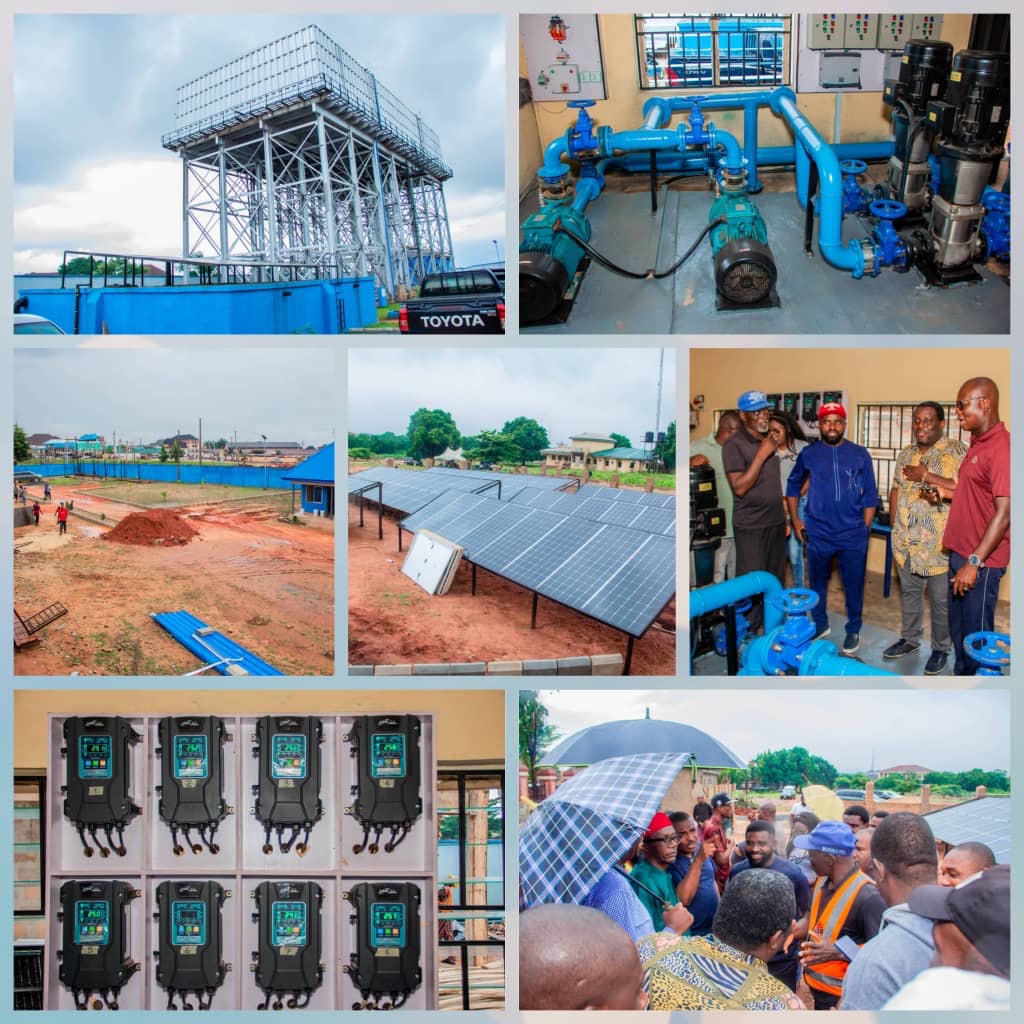In what appears to be a major stride towards transforming Anambra State into a livable and prosperous homeland, the Anambra State Governor, Prof. Charles Chukwuma Soludo, is making giant strides and remarkable progress in his commitment to tackle water scarcity and ensure access to clean and potable water in every nook and cranny of the state.
This was spotlighted over the weekend when the State Commissioner for Power and Water Resources, Engr. Julius Chukwuemeka, led a power delegation on a joint inspection of various key water schemes and projects in Awka, the capital city of the state.
The inspection, marked by a symbolic downpour that seemed to mirror the projects being inspected, was joined by some top government functionaries from different Ministries, Departments and Agencies, who all bore witness to the infrastructural strides of the Soludo Administration on the state’s water sector that was hitherto moribund for decades before the arrival of the present administration.
Among others, the magnificent Aroma Urban Water Facility, which had been non-functional for decades; the Headquarters of the Anambra State Urban Water Asset Holdings Corporation (ASUWAHC), which is undergoing renovation; the ABS Borehole Field/Water Scheme, as well as the various fetching points at Ifite and other places where the residents access the water, were all at the center of the inspection.
Speaking shortly after the inspection, Commissioner Chukwuemeka confirmed that the Aroma Urban Water Scheme project has been resuscitated, with a 2-million-liter capacity water tank, now providing potable water to major neighborhoods, including Ifite, Okpuno, Eke Awka Market, among other areas in the Awka metropolis and beyond.
He harped on the exceptional importance Governor Soludo places on water supply as part of his broader “Solution Agenda” to improve the quality of life for Anambra citizens.
“Water is life,” the Commissioner stated, adding that “Governor Soludo has made it clear that no part of the state should be left behind in accessing clean and potable water. This is why these projects, including the Aroma Urban Water Scheme, have been designed with sustainability at their core.”
Commending the Governor, the Commissioner also elaborated on the hybrid design of the water schemes, which not only rely on solar power (for the first time since their inceptions), but also have backup transformers and diesel generators to ensure uninterrupted water supply, even during cloudy conditions.
While noting that power was part of the key challenges that resulted to the failure of the water schemes in the past, Engr. Chukwuemeka re-emphasized that Anambra State’s new water projects will be operational 24/7, relying mostly on solar power. He also hinted that this initiative aligns with the state’s Vision 2070 —which Prof. Soludo Chaired its articulation team even before becoming the Governor —for a green and sustainable state, reducing reliance on conventional energy. The water schemes, he added, were also designed to avoid other reasons for the past failures, by integrating the Public-Private-Community Partnership (PPCP) model, involving local communities, both in its execution and management; as each benefiting community would appoint trained personnel to manage the facilities, thereby ensuring their long-term sustainability.
On his own part, the State Commissioner for Information, Dr. Law Mefor, who also joined in the visits, expressed his satisfaction with the inspection, stating that seeing the water schemes in operation gave him a deeper appreciation of the tangible efforts the Soludo Administration is making. He emphasized that the real impact of governance lies in delivering results rather than merely making promises.
“This is not just about promises; it’s about delivering on those promises. And, obviously, the Governor is wonderfully delivering. The people of Anambra need to know about these achievements, and it is our duty in the Information Ministry to ensure they do,” he stated.
Continuing, he said, “I never really knew we had gotten to this extent, to the point of reticulation where water can now be fetched here and there; and before long, water will be connected to houses. Before now, our children could only see tap water in textbooks, but now, it’s real.”
According to the Commissioner, “…The big dream the Governor has for Anambra State will not be complete without the water component. He has actually done more than many would have anticipated. Again, like I keep saying, most of these fantastic projects are generally underreported; but the Ministry of Information will redouble its efforts to ensure that the people of Anambra know about these achievements and how they will benefit from them,” he concluded.
Also speaking, the Managing Director of the Anambra State Urban Water Assets Holdings Corporation (ASUWAHC), Hon. Ikeobi Ejiofor, joined voice to highlight the significant strides so far made by the Soludo Administration in providing accessible water for the people of Anambra State. He added that under Governor Soludo’s administration, the Greater Awka Urban Water Scheme project has revitalized the State’s Water Board, now known as the Anambra State Urban Water Asset Holdings Corporation (ASUWAHC).
According to him, with renovations massively ongoing and nearing completion at the ASUWAHC Headquarters; and with the resolution of the disputes between the staff of the defunct Water Corporation and the state government; the foundation for transformed and improved water sector in Anambra State has been firmly established and built upon.
Hon. Ejiofor also hinted on the ongoing training programs aimed at equipping staff with the necessary skills to manage the water schemes effectively. He noted that the Public-Private-Community Partnership (PPCP) model has been instrumental in engaging local stakeholders, including traditional rulers, the youths and other community leaders, further ensuring that communities and residents have a sense of ownership over the projects.
“And, with all these and many others you’re yet to see, Anambra is on a historic pathway to becoming a model for effective water management in the coming years,” he said.
Giving an overview of the facilities under the Greater Awka Water Scheme, the Permanent Secretary, Ministry of Power and Water Resources, Sir Victor Ezekwo, said there are a total of 21 water sources in the Aroma environs, comprising 10 boreholes at the Aroma Urban Water Facility, and 11 at the ABS Borehole Field, which all pump into a ground tank that is about 50,000 gallons, where the water is generally chlorinated.
While noting that each of the boreholes has 2.5 horsepower hybrid solar pump, the Perm. Sec. also explained that all the water facilities rely majorly on solar as primary source of power, and alternatively on national grid, and diesel generator.
Continuing on the Aroma water facility, he said the facility also has transfer pumps (also known as booster pumps), comprising two vertical ones with 15 horsepower capacity and two horizontal ones with 20 horsepower capacity, two of which use solar power, while two others use other power sources. These, he said, boost/transfer water from the ground tank to the overhead tank, which is 12 meter high and about two million liters in size, and from where the water now flows by gravity to the various fetching points in different parts of Awka and beyond, including the Ifite areas, UNIZIK areas, Eke Awka Market axis, Government House, Secretariat, Commissioners Quarters axis, Church of Pentecost axis, and other areas where the masses can access it.
“The reticulation from the Aroma Tank to these areas I mentioned now is about 15 kilometers for now; and we’re still extending the pipeline network,” Sir Ezekwo said.
He further revealed that, beyond the solar power, the Aroma Urban Water Scheme has a 350KVA diesel generator, and a 300KVA transformer (for national grid).
“And at the ABS water facility, it’s the same model we have at the Aroma Urban Water Facility, based on power mix. It’s the same capacity of solar pumps that we have there. Then, on alternative power sources, we have 110KVA diesel generator at the ABS, and 100 KVA transformer. And there are two reservoirs at the ABS —one is 10,000 gallons, while the other is 20,000 gallons,” the Perm. Sec. further clarified.
He further noted that, while one of the tanks at ABS currently serves the Aroma environs and has also been reticulated to the new Government House; the other also contributes water to the tank at the Aroma Urban Water Facility, while works and further reticulation are still ongoing.
Beyond the water and power facilities, Sir Ezekwo also noted that fire service gadgets and other safety measures are in place at all the facilities and power houses.
Still on Soludo’s strides, he noted that the ongoing renovation of the Anambra State Urban Water Asset Holding Corporation (ASUWAHC) Headquarters in Awka is about 80% completed, while construction of lab at the Aroma Urban Water Facility is also currently ongoing on a high speed.
“So, in a nutshell, the Awka Scheme is about 90% completed, just few crossing of t’s and dotting of i’s, and it will be fully ready for Mr. Governor to come and commission,” Sir Ezekwo concluded.
Also present during the inspection were the General Manager of the Anambra State Bureau of Public Procurement (BPP), Dr. Okey Ezeobi; the Special Adviser to the Governor on Special Projects, Dr. Ebuka Nwankwo; the Director of Water Resources in the State Ministry of Power and Water Resources, Mr. Nwosu Tochukwu; the Information Officer of the Ministry, Mrs. Azuka Offor, the representatives of the Contractor handling the project, the Ovanman Pumps Ltd., among others.




